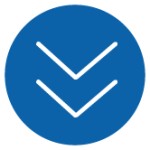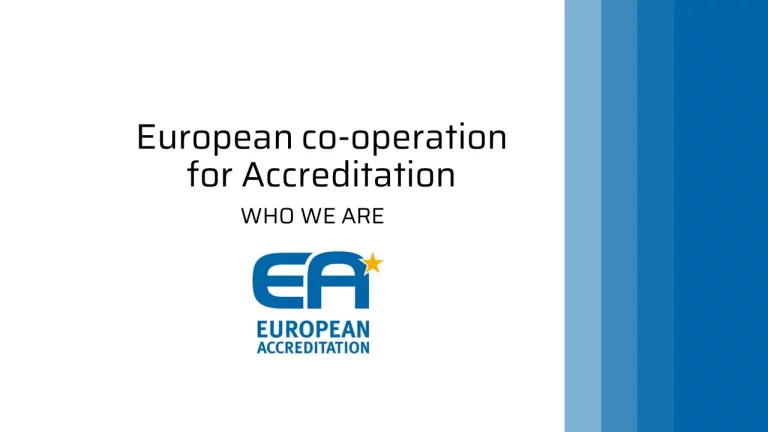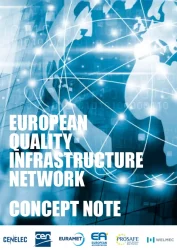The European co-operation for Accreditation (EA) is the official network of National Accreditation Bodies (NABs) in Europe. We are a not-for-profit association, legally registered in the Netherlands, and formally recognised by the European Commission under Regulation (EC) No 765/2008.
EA is entrusted with operating the peer evaluation system — a system that enables mutual recognition of conformity assessment results across Europe.
What we do
What we do
We manage a peer evaluation system consistent with international practices.
We act as a technical resource on matters related to the implementation and operation of the European policies on accreditation.
We cooperate with the European Commission and other European and international stakeholders to promote accreditation sustainable and cost efficient schemes.
We develop accreditation criteria and guidelines supporting harmonization of practices.
Our Members
EA brings together 48 National Accreditation Bodies, each officially designated by its national government. These bodies accredit organisations that carry out conformity assessment activities such as certification, testing, inspection, calibration, validation and verification.
To read our brochure
“EUROPEAN CO-OPERATION FOR ACCREDITATION”
Why we exist?
In today’s interconnected and quickly evolving world, confidence in the safety, quality, and compliance of products and services is essential. Standards alone are not enough; they must be assessed by organisations with proven competence and independence.
EA ensures that its Members uphold the most suitable standards, reinforcing
- Effective implementation of EU policies.
- Consumer safety and fair competition;
- Innovation and sustainability.
European quality infrastructure
The Quality Infrastructure refers to the institutions, systems, and methods that must be established, operated, used, and trusted by the marketplace to ensure that products and services are safe, reliable, and conform to functional and quality requirements.
The Quality Infrastructure is made up of several interlinked components:
- Standardisation, led by CEN, CENELEC, and ETSI, defines the technical and safety requirements that products and services must meet.
- Metrology and Legal Metrology, coordinated through EURAMET and WELMEC, provide the scientific and technical basis for accurate and comparable measurements. EURAMET guidelines help accredited calibration laboratories harmonise the calibration of measuring instruments. All these Calibration Guidelines can be downloaded on the following page.
- Market Surveillance guarantees that non-food products on the EU market do not endanger consumers, workers, or the environment, and that fair trade is maintained through enforcement actions such as recalls and sanctions.
- Accreditation, under the aegis? of EA (European co-operation for Accreditation), ensures that testing, inspection, and certification bodies are competent and impartial — giving confidence that standards are properly applied. It is the last le vel in the confirmity assessment chain. It gives consumers, at the other end of the chain, c onfidence in the entire system and that the products they purchase and use are safe.
To strengthen cooperation among these key actors, the European Quality Infrastructure Network (EQIN) was established in 2024, with EA as one of its founding members. EQIN unites the six major organizations representing the pillars of the European Quality Infrastructure:
- Standardisation: CEN and CENELEC
- Metrology and Legal Metrology: EURAMET and WELMEC
- Accreditation: EA
- Market Surveillance: PROSAFE
- Conformity Assessment: EUROLAB
EQIN aims at reinforcing Europe’s quality ecosystem by ensuring that public policies and market practices are supported by a coordinated, science-based, and trustworthy Quality Infrastructure. The EQI Network intends to support and enhance the quality, safety, and environmental soundness of goods, services, and processes for consumers and businesses. By working together, its members help protect citizens, support sustainable innovation, and uphold Europe’s leadership in quality and safety.
Click Below to see the Concept Note published by EQIN.
It offers valuable insights into the QI definition, role, and functioning, including the importance of this collaborative network in strengthening and promoting the QI in Europe.
European Quality
Infrastructure Network
Concept Note
European
quality
infrastructure
The Quality Infrastructure refers to the institutions, systems and methods that must be established, operated, used andtrusted by the marketplace in order to ensure that productsand services are safe, reliable and conform to functional andquality requirements.
National Quality Infrastructures (NQI) are adapted to theEuropean Quality Infrastructure (EQI) through regulations andthe action of the European co-operation for Accreditation. EA has a vital role applying and safeguarding sound European regulations and supporting its Members to develop in the international arena.
& CONFORMITY
ASSESSMENT
Lawmakers and regulators issue laws and regulations, including technical regulations.


Regulations are based on standards, including technical standards, published by standardization organizations.
Standards and regulations contain requirements, including technical requirements and conformity assessment systems.


Conformity Assessment Bodies use standards to check and state compliance and conformity with standards.
National Accreditation Bodies (NAB) assess Conformity Assessment Bodies’ technical competence and impartiality to fulfill their tasks.




